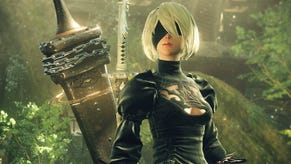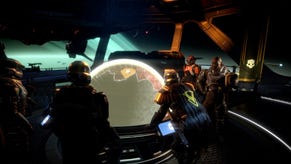Retro: Evil Genius
Whenever I mourn the passing of the Dungeon Keeper games and their much-neglected sub-genre – which I seem to do far too often, like some sort of blogging Miss Havisham - someone always chastises me for overlooking Evil Genius. I'm not overlooking it, I'm just not mentioning it.
It’s certainly the closest to a true follow-up DK’s ever had, coming from Bullfrog splinter cell Elixir and employing exactly the same Bad Guy Base-Building concept. Trouble is, in its clear desperation to not simply be Dungeon Keeper with Austin Powers artwork, it piled on layer after layer of complexity intended to mask its stolen heart. When I originally played it back in 2004, I couldn’t stand it. Genuinely loathed the thing, which very much put me at odds with most other reviewers.
Time, they say, heals all wounds. Which is a patently ridiculous thing to say, otherwise my granddad wouldn’t have been so annoyed about the toe he lost in the war. But it does at least mean I can now approach Evil Genius with a clear head, no longer clouded by sad dreams of DK3.
Here’s what it is, quickly. You’re the titular Evil Genius, a megalomaniac in the vein of 007 baddies at their most excessive. The game is the tale of how one of those ludicrous underground bases get built. You hire workers, you build barracks and eateries and prisons and giant frickin’ lasers, you earn cash from global crime, and you fend off incursions from snooping secret agents. It’s Theme Park with torture and fighting.
Looking at it now, one thing’s immediately apparent – it’s an amazingly good-looking game, dialling back detail in favour of cartoon stylisation in such a way that the passage of time has all but untouched it. While it owes much to Austin Powers (in direct references as well as the overall tone) and possibly No-One Lives Forever, it predates Team Fortress 2 in terms of exaggerated Norman Rockwell aesthetics. Evil Genius isn’t as tight (as later, less immediately distinct character types arrive the Man From U.N.C.L.E. vibe gets diluted into something vaguer) but now all that irritatingly ubiquitous Austinmania has subsided, its own character shines much more. You could almost drop its loading screens into TF2:
The animations are incredible, too. Obviously these are uber-scripted, cyclic routines, but when you can squeeze this kind of charm and subtlety out of a four-year old strategy game, Fallout 3’s spasming doll-men really do seem unforgivable. Valets (in the hotels designed to divert attention away from your evil lair) clean the bar and juggle cocktails while they wait for tourists; guards lean smugly against the wall as they watch captured agents undergo torture; invading burglars mime delighted surprise when they spot a valuable object... You see none of it unless you zoom in close, and that’s what makes it so delightful – there’s almost no reason for so many neat, charming little touches to be in the game, but they are anyway.
That said, there is one good reason for that much incidental detail. It’s something to do while you wait for the game. Evil Genius is ponderously slow. With no direct control over your minions, there’s nothing you can do if they’re too busy elsewhere or too stupid to finish building a room you’ve ordered, or to put out a fire that’s gradually claiming all the bunkbeds in the barracks. All you can do is wait. The game’ll get there when it’s good and ready. It’s not that the decision to make minions entirely autonomous is a bad one – you are, after all, the Evil Genius, not the Head Foreman – but it’s that what you get to do yourself is too insubstantial or too finickity to compensate.
Half the time, you’re waiting for cash to slowly dribble in from the global map so you can build /anything/, and the only way to speed that up is to send more of your minions over to another continent – which in turns involves waiting ages for a chopper to ferry ‘em there. Perhaps that’s the central problem – this is too much like the reality of running a criminal empire, and not enough like the fantasy of one. Not that I know what the reality of running a criminal empire is like, of course - at least not until we move on to RPS Stage II.. I just presume it involves a lot of paperwork and long-haul flights.
To bring in Dungeon Keeper – and I’m impressed with myself that it’s taken this long to do the “DK did x feature better” whine – it really hits the centre ground between too much and not enough power. Most of the time, you feel like you’ve got the upper hand, both in terms of economy and of enemies. Here though, you’re generally either penniless and frustrated because you have to painstakingly build not just rooms but every item within that room, or bored: artificial tension from the former, and a failure of flow from the latter. That the combat jumps from the easily-containable distraction of a couple of investigators to the constant irritation of streams of minion-decimating soldiers doesn’t help. It’s not particularly enjoyable in itself – all it serves to do is to slow the game down further.
It's never a catastrophe. It's often very thoughtful and bold in pushing a template that Bullfrog themselves left static with Dungeon Keeper 2, it really does look lovely and the sprawling size your base eventually reaches is a prouder sight than DK ever managed. So the right look, the right foundations but far too much fiddliness and not enough maniacal revelling in being a power-crazed bald midget with millions in his pocket.
With more spark and less drawn-out micro-management, Evil Genius could have been a break-out hit, this decaying genre’s salvation from a mess of Cardboard Box Tycoons and Theme Abattoirs. It didn’t seem to set the charts on fire, despite being a far more consciously commercial game than Elixir’s only other offering, the troubled and compromised Republic: The Revolution. That spelt the sad end of Elixir, the studio that had previously seemed best set to continue the Bullfrog legacy. They cited publisher unwillingness to take risks in the current climate, implying they’d rather fall on their sword than bow to commercial pressure. That's astonishingly noble if it's the case. I truly believe they’d have a managed a solid-gold classic sooner or later, but since the closure studio head Demis Hassabis has dropped out of games entirely, instead working in cognitive neuroscience and bagging awards for his research into memory. Admittedly, that’s probably more help to the world than Evil Genius 2 would have been.
Oh - here's a demo of Evil Genius if you're curious. Worth admiring its remarkably ageless look if nothing else. Finally, imagine if the game had lived up to this incredible box art:














